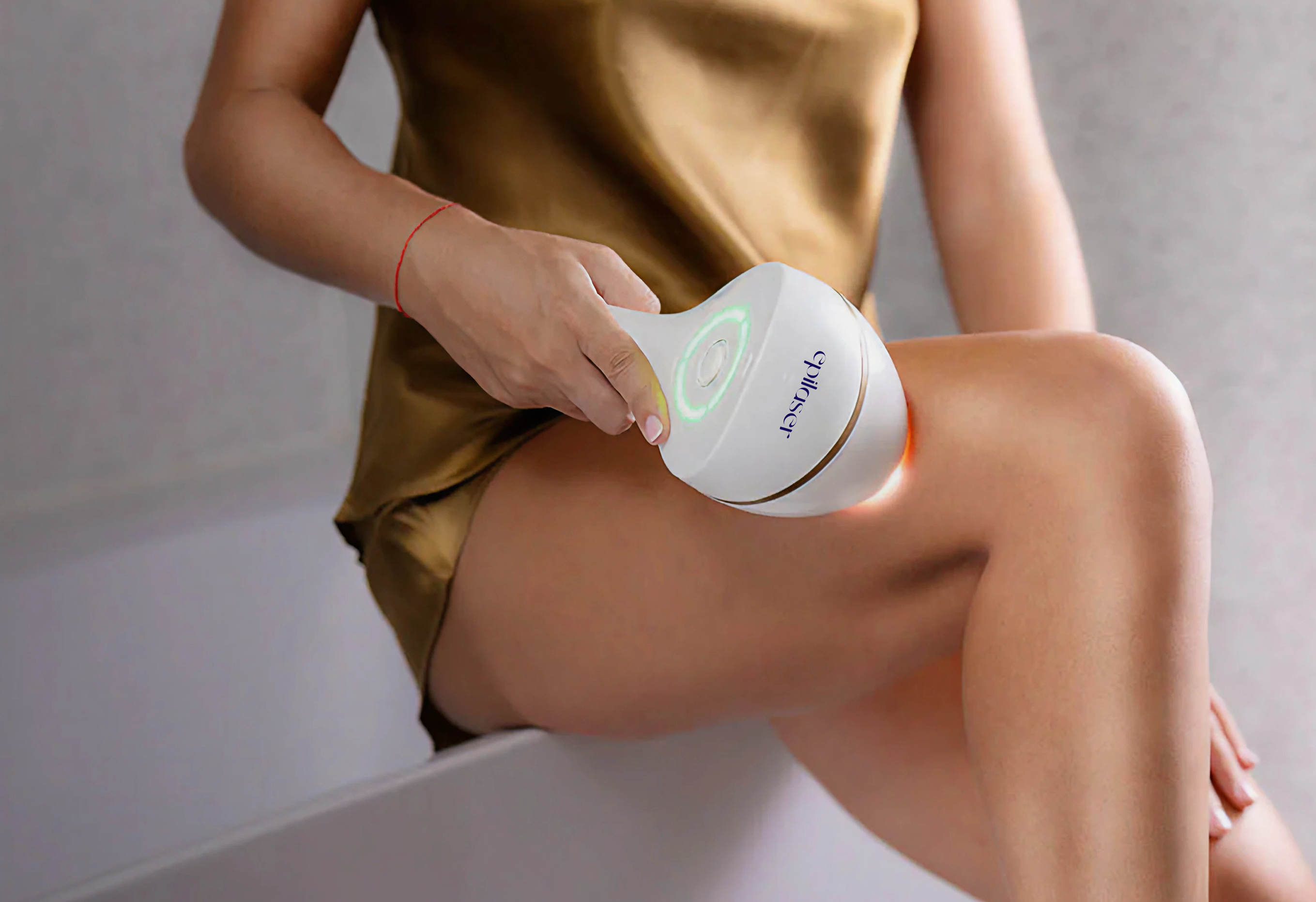At-Home vs Professional Hair Removal Devices: What’s the Difference?
by Noah Cooter
Okay, you’ve done the research, read every article, watched every video, and concluded that laser hair removal is your best bet. But there’s still one more big decision to make. Should you schedule an appointment at a clinic for professional laser hair removal, or purchase an at-home laser device? In this article, we’ll break down the differences between clinical and home devices so you can make an informed decision and begin your laser journey with confidence.
Laser hair Removal: The Basics
There are several laser types used to remove unwanted hair, both in home devices and professional lasers. The most common laser types used in professional treatments are alexandrite, Nd:YAG, and diode laser. Operating at a 755nm wavelength, alexandrite lasers are only suitable for lighter skin and are most effective on dark hair. Nd:YAG lasers have a longer 1064nm wavelength, which makes them safer for darker skin. Diode lasers can be calibrated to various wavelengths to treat a variety of skin types.
The options are narrowed down when it comes to at-home laser devices for hair removal uses. At present, there are no reputable alexandrite or Nd:YAG devices sold for use in the home, so you’ll likely be looking at a diode laser device. Since diode lasers can generate varying wavelengths, they make a great option for at-home laser hair removal. When browsing online, pay attention to the wavelength specifications. The 808nm wavelength is ideal for types 1-4 on the Fitzpatrick scale, while the 980nm wavelength is ideal for types 5 and 6.
You’ve doubtless encountered IPL devices as well. Though very common, IPL devices are not true laser technology. Instead, they bombard the skin with intense pulsed light. At-home IPL devices are available, as well as in-clinic IPL treatments. Since IPLs use broad spectrum light, they offer less precision than diode lasers. Moreover, IPL devices are generally not suitable for darker skin (types 4-6 on the Fitzpatrick scale). Side effects can include burning and hyperpigmentation..
What is the Fitzpatrick Scale?

The Fitzpatrick scale is a classification system used to categorize human skin tones and their sensitivity to ultraviolet (UV) light. It was developed in 1975 by dermatologist Thomas B. Fitzpatrick. This scale helps to create objective guidelines when consulting for hair removal or seeking medical advice about a cosmetic procedure. If you receive professional laser treatments, your clinician can tell you where you land on the scale. There are also a wealth of resources online to help you determine which type you are.
Why Does Skin Tone Matter?
You can find a laser hair removal device for dark skin to use at home, or you can find a professional laser hair removal clinic that provides treatment for darker skin. Either way, you’ll want to ensure you’re receiving the correct treatment. Devices that emit laser energy in shorter wavelengths can damage melanin in darker skin. The laser energy will heat the melanin in skin as well as the melanin in hair follicles, which can result in hyperpigmentation (skin discoloration) and scarring. If you’re going to a professional laser hair removal clinic, be sure the clinician gauges your skin on the Fitzpatrick scale so the correct device is used. If you purchase an at-home device, be sure to choose the correct device for your skin. Epilaser 808 is calibrated for skin types 1 through 4 on the Fitzpatrick scale. Epilaser 980 is calibrated for skin types 5 and 6 on the Fitzpatrick scale.
In-Clinic Laser Hair Removal vs At Home: Which is Safer?
One benefit of an in-clinic procedure is the reassurance of working with a trained clinician. Many at-home devices can be dangerous if used incorrectly. In-clinic treatments can offer peace of mind because you don’t have to be a laser expert—that role belongs to your practitioner. Your clinician will provide you with any protective eyewear required and any gels or creams needed after treatment. However, clinical procedures are not without risk. We’ve all heard horror stories. Just because someone claims to be an expert, doesn’t mean they are. Be sure to conduct thorough research and read reviews before signing up for any clinical procedure.
If a reputable clinician is not accessible in your area, you may consider an at-home device. We recommend choosing a device that’s simple to use and doesn’t pose risks to your skin. Epilaser uses an HD imaging system and smart image processing to identify and target follicles and follicles only. If no follicles are present—or if all the follicles have already been treated—Epilaser won’t engage its lasers. Therefore, it’s impossible to overwork, irritate, or burn your skin.
Are Professional Laser Appointments More Expensive?
Laser hair removal is a process. Follicles are eliminated over time, and new follicles must be treated as they develop. Since a large number of sessions are necessary, clinical procedures can become rather expensive. Deals can be found for introductory sessions, but you should expect to invest thousands of dollars over time to achieve lasting fully-body results.
There is a wide range of price points for home devices. They can represent substantial savings, so long as you invest in a device that works well for your needs. Utilmately, it only makes sense financially if the device delivers the desired results. Why pay less for a device that doesn’t work—or worse yet, burns your skin? Keep in mind, certain at-home devices come with upkeep costs. IPL devices require replacement flash bulbs, whereas the true diode lasers in Epilaser offer a lifetime of unlimited use.
Laser Hair Removal at Home vs Professional Laser: The Convenience Factor
For those with a busy schedule, managing appointments and traveling to and from clinics for professional laser services can become burdensome. In this respect, home devices offer a clear advantage. On the other hand, if your calendar is clear and you have a reputable clinic in your area, you may enjoy the convenience of simply sitting back and letting a professional laser hair removal technician carry out the treatment.
Regardless of whether you’re using at-home devices or getting treatments in a clinic, there are likely to be inconvenient aftercare restrictions. Most devices, whether at-home or in-clinic, require you to avoid direct sunlight after use. This isn’t the case with Epilaser. Since it doesn’t affect skin, you’re free to get on with life immediately after treatment.
Laser Hair Removal Professional vs At Home: Which Hurts More?
Generally speaking, professional laser hair removal devices are stronger than at-home hair removal machines, so the pain of treatment can be greater. Clinicians can provide you with a numbing gel, but the extra cost is baked into the bill. That’s not to say that all home devices are a walk in the park. Many devices available online are described as being quite painful. Although Epilaser is as strong as clinical devices, for many, treatments are completely pain-free.
At Home Laser Hair Removal vs In-Clinic Laser: Which is More Effective?
You should expect flawless results from an experienced clinician. No patches, no missed hairs, just the professional laser hair removal experience you paid for. If you’re performing your own laser treatments at home, there may be a learning curve. You might miss hair or overwork the skin. Effectiveness will depend heavily on the device you use. Since Epilaser uses an HD camera and intelligent algorithms to target follicles, you’re sure to get professional, salon-quality results. Best of all, Epilaser is safe and effective for all skin types.
The Best of Both Worlds
Choosing between professional laser hair removal services or purchasing an at-home device can feel overwhelming. Thankfully, there’s a device that makes the decision easy. Epilaser is as strong as professional lasers, incredibly easy to use, and FDA cleared for use in the home. Just power it on and place over your skin for easy hair reduction on your terms, regardless of skin and hair type. Epilaser automatically seeks out each hair follicle for ultra-precise removal without affecting skin, delivering long-lasting results from facial hair removal to larger body areas. Shop Epilaser 808 and Epilaser 980 today and experience luxuriously smooth, hair-free skin in fewer sessoins without the hassle.






Share:
Laser Hair Removal vs Electrolysis
How Often Should You Do At Home Laser Hair Removal?